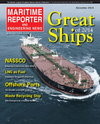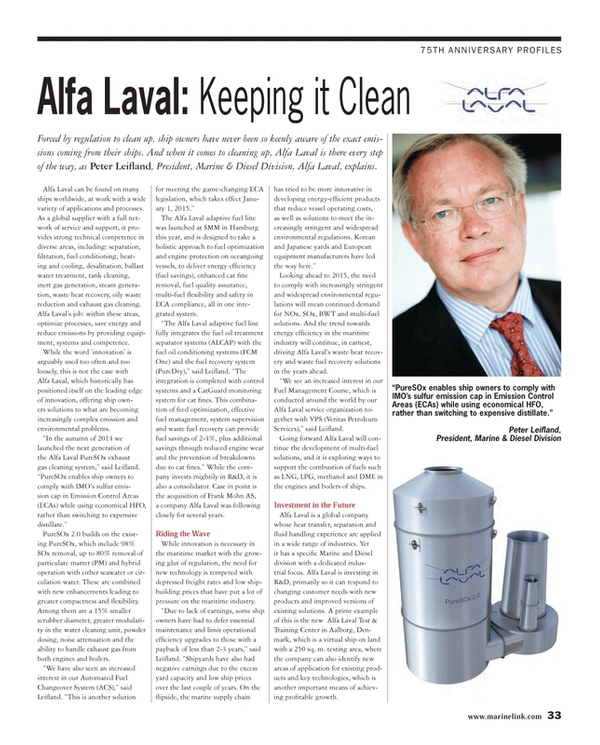
Alfa Laval: Keeping it Clean
Forced by regulation to clean up, ship owners have never been so keenly aware of the exact emissions coming from their ships. And when it comes to cleaning up, Alfa Laval is there every step of the way, as Peter Leifland, President, Marine & Diesel Division, Alfa Laval, explains.
Alfa Laval can be found on many ships worldwide, at work with a wide variety of applications and processes. As a global supplier with a full network of service and support, it provides strong technical competence in diverse areas, including: separation, filtration, fuel conditioning, heating and cooling, desalination, ballast water treatment, tank cleaning, inert gas generation, steam generation, waste heat recovery, oily waste reduction and exhaust gas cleaning. Alfa Laval’s job: within these areas, optimize processes, save energy and reduce emissions by providing equipment, systems and competence.
While the word ‘innovation’ is arguably used too often and too loosely, this is not the case with Alfa Laval, which historically has positioned itself on the leading edge of innovation, offering ship owners solutions to what are becoming increasingly complex emission and environmental problems.
“In the autumn of 2014 we launched the next generation of the Alfa Laval PureSOx exhaust gas cleaning system,” said Leifland. “PureSOx enables ship owners to comply with IMO’s sulfur emission cap in Emission Control Areas (ECAs) while using economical HFO, rather than switching to expensive distillate.”
PureSOx 2.0 builds on the existing PureSOx, which include 98% SOx removal, up to 80% removal of particulate matter (PM) and hybrid operation with either seawater or circulation water. These are combined with new enhancements leading to greater compactness and flexibility. Among them are a 15% smaller scrubber diameter, greater modularity in the water cleaning unit, powder dosing, noise attenuation and the ability to handle exhaust gas from both engines and boilers.
“We have also seen an increased interest in our Automated Fuel Changeover System (ACS),” said Leifland. “This is another solution for meeting the game-changing ECA legislation, which takes effect January 1, 2015.”
The Alfa Laval adaptive fuel line was launched at SMM in Hamburg this year, and is designed to take a holistic approach to fuel optimization and engine protection on oceangoing vessels, to deliver energy efficiency (fuel savings), enhanced cat fine removal, fuel quality assurance, multi-fuel flexibility and safety in ECA compliance, all in one integrated system.
“The Alfa Laval adaptive fuel line fully integrates the fuel oil treatment separator systems (ALCAP) with the fuel oil conditioning systems (FCM One) and the fuel recovery system (PureDry),” said Leifland. “The integration is completed with control systems and a CatGuard monitoring system for cat fines. This combination of feed optimization, effective fuel management, system supervision and waste fuel recovery can provide fuel savings of 2-4%, plus additional savings through reduced engine wear and the prevention of breakdowns due to cat fines.” While the company invests mightily in R&D, it is also a consolidator. Case in point is the acquisition of Frank Mohn AS, a company Alfa Laval was following closely for several years.
Riding the Wave
While innovation is necessary in the maritime market with the growing glut of regulation, the need for new technology is tempered with depressed freight rates and low shipbuilding prices that have put a lot of pressure on the maritime industry.
“Due to lack of earnings, some ship owners have had to defer essential maintenance and limit operational efficiency upgrades to those with a payback of less than 2-3 years,” said Leifland. “Shipyards have also had negative earnings due to the excess yard capacity and low ship prices over the last couple of years. On the flipside, the marine supply chain has tried to be more innovative in developing energy-efficient products that reduce vessel operating costs, as well as solutions to meet the increasingly stringent and widespread environmental regulations. Korean and Japanese yards and European equipment manufacturers have led the way here.”
Looking ahead to 2015, the need to comply with increasingly stringent and widespread environmental regulations will mean continued demand for NOx, SOx, BWT and multi-fuel solutions. And the trend towards energy efficiency in the maritime industry will continue, in earnest, driving Alfa Laval’s waste heat recovery and waste fuel recovery solutions in the years ahead.
“We see an increased interest in our Fuel Management Course, which is conducted around the world by our Alfa Laval service organization together with VPS (Veritas Petroleum Services),” said Leifland.
Going forward Alfa Laval will continue the development of multi-fuel solutions, and it is exploring ways to support the combustion of fuels such as LNG, LPG, methanol and DME in the engines and boilers of ships.
Investment in the Future
Alfa Laval is a global company whose heat transfer, separation and fluid handling experience are applied in a wide range of industries. Yet it has a specific Marine and Diesel division with a dedicated industrial focus. Alfa Laval is investing in R&D, primarily so it can respond to changing customer needs with new products and improved versions of existing solutions. A prime example of this is the new Alfa Laval Test & Training Center in Aalborg, Denmark, which is a virtual ship on land with a 250 sq. m. testing area, where the company can also identify new areas of application for existing products and key technologies, which is another important means of achieving profitable growth.
(As published in the December 2014 edition of Maritime Reporter & Engineering News - http://magazines.marinelink.com/Magazines/MaritimeReporter)
Read Alfa Laval: Keeping it Clean in Pdf, Flash or Html5 edition of December 2014 Maritime Reporter
Other stories from December 2014 issue
Content
- Satellites Reveal Worldwide Ship Traffic Up 300% page: 10
- Bulk Carrier Freight Rates Predicted to Peak in 2016 page: 12
- MLC2006 Impact: 113 Ships Detained page: 13
- Maritime Quarantine & Isolation page: 16
- FPSOs Require Special Monitoring to Support IMR page: 18
- As Interest in LNG Surges, Regulators Struggle to Keep Pace page: 20
- NASSCO: The Face of US Shipbuilding page: 24
- Hempel: Born in Maritime page: 29
- Since 1927, The Damen Way page: 30
- Air Products: Pioneering Gas Processing Solutions page: 32
- Alfa Laval: Keeping it Clean page: 33
- R.W. Fernstrum: Keeping it Cool page: 34
- MAN Diesel & Turbo: Power Play page: 35
- MLS: eLearning Re-thought page: 36
- Great Ships of 2014: Al Kout Environmental, Piracy Protected, Proven page: 40
- Great Ships of 2014: Allseas’ Pieter Schelte page: 42
- Great Ships of 2014: CSCL Globe - world’s largest containership page: 44
- Great Ships of 2014: Harvey Energy page: 45
- Great Ships of 2014: Quantum of the Seas page: 46
- Great Ships of 2014: The Hybrid-Powered Semper Fi page: 47
- Great Ships of 2014: Ceona Amazon page: 48
- Great Ships of 2014: R/V Neil Armstrong - Multifaceted Sea Explorer page: 50
- Great Ships of 2014: Linda Oldendorff page: 51
- Great Ships of 2014: CSAV Tyndall page: 52
- Great Ships of 2014: Top Coral Do Atlantico - A 'Mega' Pipelayer page: 52
- Great Ships of 2014: Linda Oldendorff page: 53
- Great Ships of 2014: Harvest Frost page: 53
- Great Ships of 2014: Gas Star - 84,000 CBM LPG Carrier page: 54
- Great Ships of 2014: M/V Harvest Leader - ECO Class PCTC page: 55
- Lindenau’s Concept: Waste Recycling Ships page: 56
- Great ships of 2014: Siem Moxie page: 57
- Great Ships of 2014: Höegh Jacksonville page: 57
- Are Offshore Ports the Future? page: 58
- Marine Lubricants: New Year, New Emission Rules page: 62
- Phoenix EcoMod 450 Floodlight page: 71
- MES, Viking Yachts Partner for Quiet Performance page: 71
- Air Purifying System for Tug-turned-superyacht page: 71
- Norsafe for Pieter Schelte page: 71
- EnviroLogic: SVGP Compliant Fluids & Cleaners page: 71
- ExxonMobil Debuts Zinc-free Marine Engine Oil page: 71
- Water Reclamation System Delivered to Transocean page: 71
- Ocean Signal Debuts RescueME EPIRB1 page: 71
- NEW EAL from Shell: Naturelle Stern Tube Fluid page: 71
- Inventor. Builder. Entrepreneur. Optimist. Schweitzer page: 86


